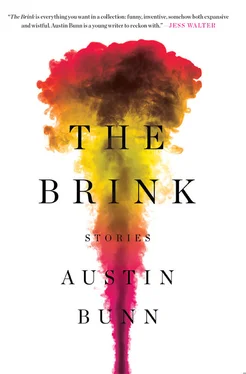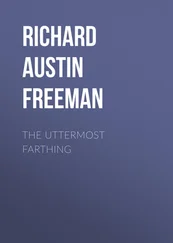While she watched, two brown-skinned islanders paddled out to the raft in an outrigger. They tied up and peered through the water. Haley drew a sharp breath. The taller of the two dove, his hands steepled over his head, and did not surface. Her chest tightened. They were diving for the ring.
Haley rushed along the walkway toward the hotel lobby, her eyes locked on the figures. She passed a hotel worker, a short, chubby woman. “Out there, bad things,” Haley said, and the woman smiled warmly. Haley wanted to scream. At the concierge desk, she banged the silver bell. The concierge came wiping food from the corners of his mouth.
Haley pointed. “What are they doing?”
The concierge gazed outside, black eyes squinting. “These men work in this place.”
“You ask them to get our ring?”
“We ask,” the concierge said, which wasn’t even an answer.
Haley waited while he located a whistle. The concierge blew it out on the deck and the pair paddled back to the shore. They were both teenagers. The shorter seemed terrified to be noticed at all. But the taller figure, the one Haley had watched dive, was pretty and unafraid. His muscles looked like they had been scored into clay with a knife. He was lighter-colored than the concierge, almost caramel. Like the others, he seemed to have no body hair whatsoever, a flawless envelope of skin. His age was impossible to guess, maybe eighteen, maybe thirty, there were no wrinkles to judge. Standing in wet swim trunks, he scanned Haley as much as she judged him. She realized she was wearing one of Mac’s vintage T-shirts that read, “South East Asian Community Pride!” Please God let them not read English.
“What’s your name?” Haley asked.
“Langy,” the concierge said for him. “He only speaks Balinese.”
“What was Langy doing out there?” she said.
The concierge translated. Between each consonant there were these crazy, sweeping hammocks of vowels. “He say he try to get your ring,” the concierge said. “But he cannot find it.”
“How do I know he doesn’t have it already?” Haley asked.
It was an absurd question — he had nowhere to hide it — but it felt appropriately skeptical and assertive. Haley watched Langy’s face for signs of nervousness. His cheekbones, she wanted his cheekbones. Langy shook his head and spoke.
“What he say?” she asked.
“He say he doesn’t see your ring.”
“He say more than that,” Haley said. “I hear more sentences than that.”
The concierge looked at her with annoyance. “Miss—” he said.
“Mrs.,” Haley said.
“Please calm,” he said. “Your ring is where you leave it.”
Mac returned from the Internet café with a warm bottle of orange soda for her. He’d met a middle-aged Australian tourist who’d been on the street when the bombs went off, who had a cell-phone camera. The footage “was insane,” Mac said as he sat next to Haley on the foam mattress and tried, unsuccessfully, to recline on one of the odd triangular pillows.
“You watched it?” Haley asked.
“He seemed like he needed to talk,” Mac said.
It turned out there’d actually been one blast inside the restaurant, which killed some people, and when others rushed outside, there was another bomb waiting street-side, a trap.
“Please stop,” Haley said. “Are we getting out of here?”
Flights were booked for two days, Mac explained. Anyway, now was the safest time, he said. “These things never go in runs.”
“You don’t know that,” she said.
“I do,” he said. “I read The Economist .”
“I never see you read The Economist. ”
“I savor The Economist on the toilet. Where you are not.”
She told him about the staffers trying to dive for the ring. Mac thought she was paranoid. Nobody would try anything in the daytime, he said. Plus, the raft was right there. They could see it through the open doors of the bungalow.
He was doing his best to buoy her. He fetched two cocktails from the bar, tall glasses dressed with hibiscus flowers. He gave her a back rub that, inevitably, led to more. But even with the rum and slurry of tropical fruits in her, Haley was not in the mood. A pale green gecko moved across the wall above them. Everything seemed to be moving at the fringes, including the bungalow itself, rocking slightly in a breeze. Mac held her and napped. Haley looked out across the water and wondered what kept the raft in place, what deep cable made it stay.
In late afternoon, the clouds cracked and sent down sheets of rain. The power flickered in the bungalow for a moment and a volatile, blue-gray light rushed into the room. How fragile this place was, how jury-rigged.
“It’s pouring out,” she called out to Mac, in the shower. “The ring’s going to get washed away.”
Mac came to her in one of the big towels.
“What’s the worst that happens?” he asked. “The worst is that we go and buy another ring.” He thought for a moment. “No, the worst is that I drown trying to get the ring back and you have to soldier on, the sexy widow, the WILF. Unable to love again.”
Haley tried to pull away, but Mac reached his arm around her, intuiting her tension. Maybe other things got less beautiful as they got older, but his arms were strong and could hold her.
“Drowning was too much?” he said. “I’m sorry.”
He convinced her to go to dinner off-resort, at a warung he had passed on his way to the Internet café. It was a classy restaurant, he said, with music and a guard out front checking bags and ID. Haley was reluctant to leave the resort, to join him on the rusting blue moped he rented. “You go to more dangerous places in Chicago, babe. You’re totally hard-core.”
“Is this the part where you mention Linda Hamilton?”
“This is not that part.”
She got on the moped and discovered it didn’t feel like imminent death, a bullet train to their bodies in a ditch. It was more like a restless carousel animal. When Mac cranked the pedals and the engine roared to life, she felt a swell of pride in him for seeming like he knew what the hell he was doing.
The road ran along a narrow causeway, beach on one side and marsh on the other. Along the roadside, roosters had been deposited in bell-shaped baskets, looking abandoned, watching the traffic. Taxis buzzed past them, horns beeping constantly. A warm breeze lifted Haley’s spirits, softened the edges of her anxiety until another moped blasted past them with a “No Police” bumper sticker on the back. What could that possibly mean? Who wouldn’t want police? She belted her arms tighter around Mac and stared out into the march. She saw a small shrine, a gilded tower that looked like a dollop of frosting, backlit by sundown. People came all this way to meditate in a bog.
The restaurant sprawled off the side of a hotel, with tiki torches flanking the front. The lot was crowded with cars and motorcycles, which was a good sign — the place was popular. At the entrance, an islander checked bags, but he waved them in.
“Great security,” Haley said. “I feel really safe.”
“Come on,” Mac said. “I’m a white guy wearing jams right now. I’m not scaring anybody.”
Over speakers came the sounds of gongs and a woman’s voice wandering the scale. A mixed crowd of light and dark faces filled the room. Haley felt reassured to see Westerners. They requested a table far from the entranceway. The restaurant opened out to a patio at the back, overlooking the beach. If necessary, Haley thought, that was where she would run. When they sat, on chairs made from the trunks of coconut trees, Haley caught herself in the glass of the table surface. She wore no makeup and her long blond hair had gone viny in the humidity. She looked like a woman who had stopped showing up for things.
Читать дальше











